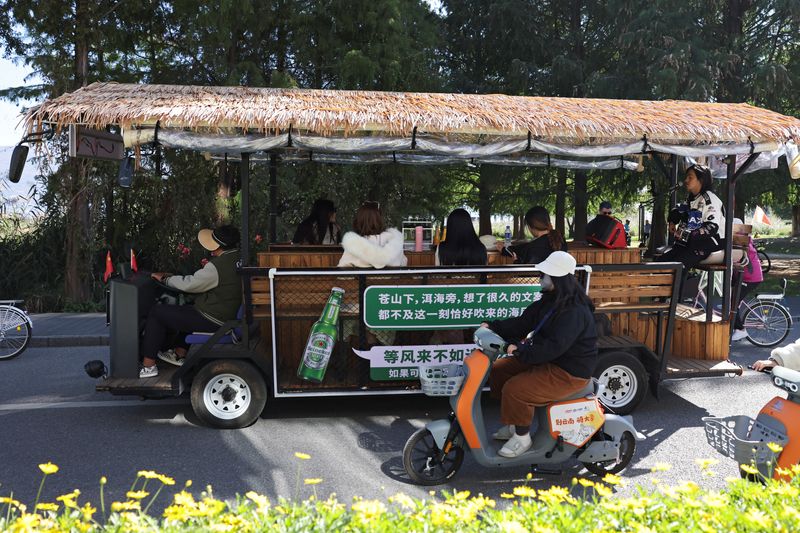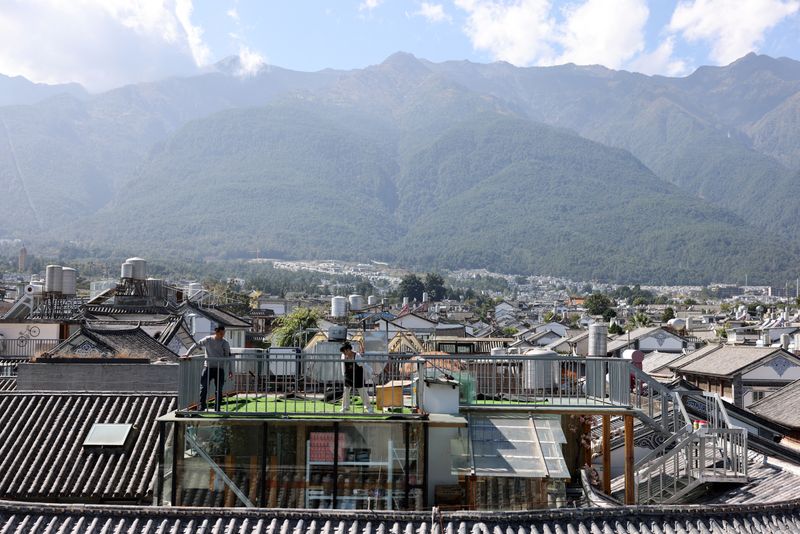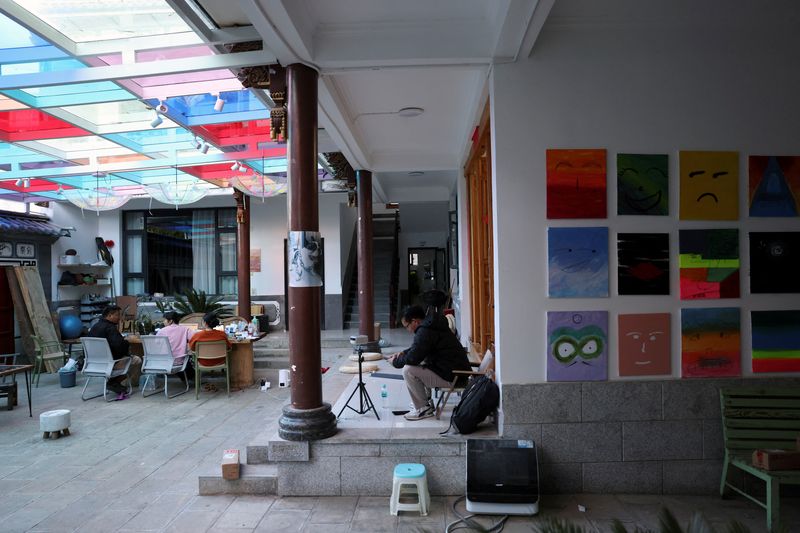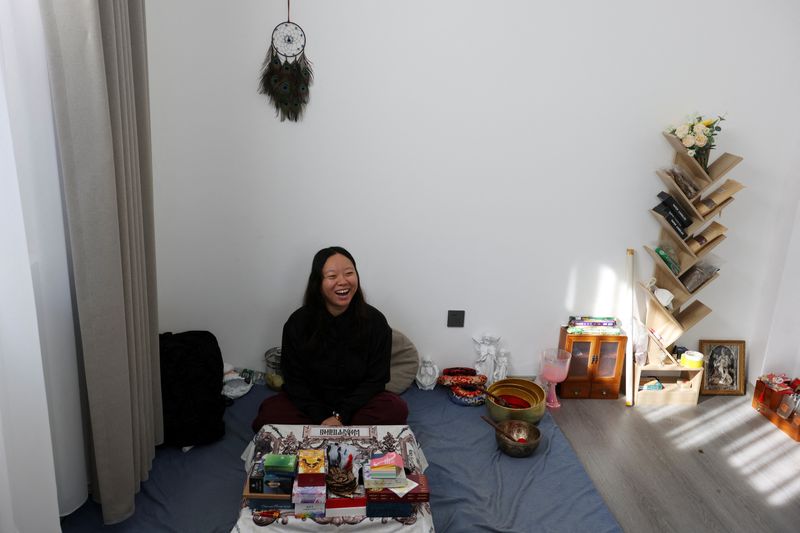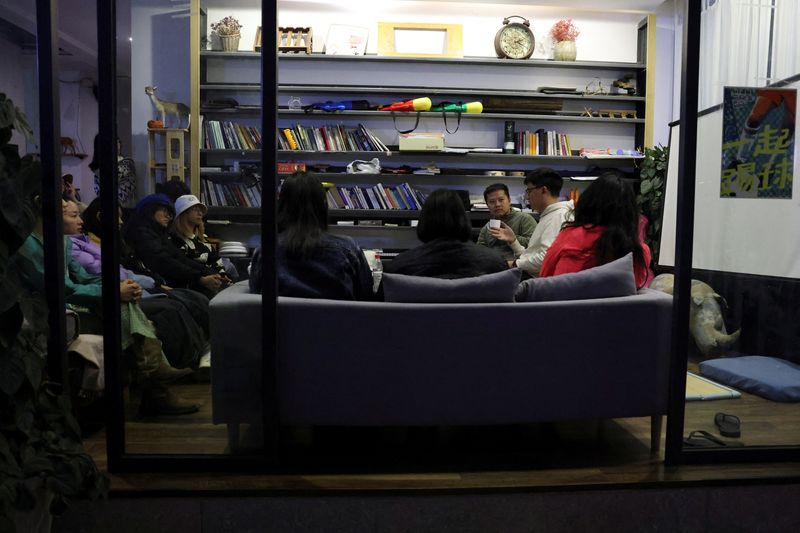By Laurie Chen
DALI, China (Reuters) – In this mountain town in China’s southwest, drifters and tarot card readers rub shoulders with tech entrepreneurs and artists. Many are former city-dwellers in search of an elusive prize in authoritarian China: Space for open discussion and exchange of ideas.
In one co-working space, a group of young adults asked questions about the effect of Trump-era populism on U.S. media during a discussion led by a Chinese journalist about the American position on the Israel-Gaza conflict. In a nearby cafe, others discussed art, sexual harassment and the listlessness of China’s youth.
As President Xi Jinping tightens his grip on the restricted personal freedoms of Chinese citizens and the economy stutters, exacerbating a youth unemployment crisis, Dali in Yunnan province has become a haven for those seeking to escape the pressure.
They are drawn by the cheap rents, mild climate, stunning scenery and a history of relative tolerance, which were popularised by a television drama this year about a digital nomad.
Dali’s Old Town district, administratively part of a city of 650,000, has attracted culture workers since the late 1990s, said Minhua Ling, an expert on Chinese migration at the Geneva Graduate Institute, adding that the normalisation of remote work and Dali’s less restrictive policies during China’s zero-COVID crackdown also increased its appeal.
In November, searches for “Dali” on WeChat were up 7% from a year ago, having surged some 290% on one day in late July, when many Chinese were booking summer trips.
Reuters interviewed 13 Chinese migrants to Dali, who described a refuge on the fringes of mainstream society, but also one that implicitly challenges Xi’s “China Dream” of a prosperous nation ideologically loyal to the Communist Party. Many of them spoke on condition of anonymity for fear of government retaliation.
“When younger generations are materially sufficient but spiritually lost, of course they will seek personal growth and freedom,” said Bai Yunxi, a Dali-based 33-year-old civil servant-turned-astrologer.
Six of the people expressed concern about increased police scrutiny of their activities, citing abrupt cancellations of large-scale events and police raids.
Dali city’s propaganda bureau did not respond to a faxed request for comment on the crackdowns and Dali’s efforts to attract young skilled workers.
‘IDEAL KINGDOM’
With youth unemployment at a record high this summer – when China stopped releasing the statistic – and a stagnant rural population due to low fertility rates and urban migration, Beijing has tried to enlist young people in “rural revitalisation”.
Xi has urged graduates to “return to their hometowns” and “actively seek hardships”, alluding to his experience during the Cultural Revolution. But the message does not appear to resonate with urban youths who grew up with expectations of prosperity but now find social mobility hard to attain.
Dali, where several of the people interviewed by Reuters said they found an escape from the conservative social values of rural China, is an exception to the flight of youth to large cities that has occurred since China’s economic modernisation.
Bai moved to Dali in September, quitting her government job to give online astrology readings. She shares a three-storey house with her partner, a friend and three cats. “My living situation provides enough space to develop my career and personal life without interference from others,” she said.
She also referenced Dali’s nickname, “Ideal Kingdom” – a pun on its Chinese characters that also reflects its 10th-century status as an independent state – as part of its appeal.
Recruitment startup founder Chen Zhengyun, 37, said living in Dali freed him from societal pressure to get married early, as state calls for matrimony grow louder amid China’s demographic crisis.
“There are some personal topics that you can’t bring up elsewhere that you can talk about here,” said Chen, adding that the concentration of like-minded young people, social events and tolerance for diverse lifestyles allowed him to explore open relationships.
POLICE OVERSIGHT
The local government has sought to attract young tech talent and in September asked digital nomads for input on policies, two community organisers told Reuters.
But the town’s population also includes many young people who say they are sceptical of Beijing’s attempts to shape their personal lives.
A large digital nomad conference with art and tech-related seminars was abruptly cancelled on Nov. 2, a week before its scheduled start, due to “deep consideration of various factors”, the organiser, co-working space NCC, wrote on social media.
NCC declined to elaborate publicly, citing sensitivities.
During a recent visit, Reuters saw a police surveillance camera trained on NCC’s main communal area.
Three people familiar with event organisers in Dali said the November forum – like another conference on decentralised internet technologies planned last year – was cancelled after the government abruptly withdrew funding and support.
Many digital nomads who use co-working spaces are involved with technologies like blockchain, according to organisers, which they say has drawn scrutiny from local authorities.
Two other co-working spaces were shut down unexpectedly for months, with one also visited by local police earlier this year, according to three people familiar with the matter.
China banned cryptocurrency mining and trading in 2021, part of a broader crackdown on the tech sector.
“We are more low-key and don’t emphasise digital nomads in our marketing anymore,” one co-working space staffer told Reuters, adding that conservative local governments in rural towns like Dali are “cautious of emerging technologies”.
Such state monitoring efforts do not surprise Ling, the academic. Since digital nomads, unlike university students, “are not subject to structured discipline, they are harder to manage”, she said.
(Reporting by Laurie Chen; Editing by Katerina Ang)
